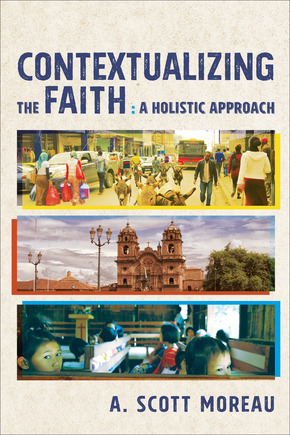
by A. Scott Moreau
Contextualizing the Faith: A Holistic Approach. Grand Rapids, MI. Baker Academic, 2018. 256 pages.US$26.99
This review was originally published in Evangelical Missions Quarterly, April–June, 2019: 42.
Ashrams instead of seminaries? This is one example of contextual theological education by Indian Christians described in this intriguing book by A. Scott Moreau (70–71). Moreau is a prolific writer on the thorny issue of contextualization which has engendered widespread debates among many concerned with the relationship between Christian faith and culture. The controversial term itself raises suspicion since it was “adopted in World Council of Churches circles from 1972 onward” (vii). The author draws from Scripture to show that while the term may be relatively new, contextualization “resides at the intersection of God’s unchanging Word and the ever-changing settings in which people live out their faith as followers of Christ” (1). Moreau recognizes that syncretism, the “intermingling inappropriate elements of other religions into our Christian faith” (4), is a potential danger often associated with contextualization.
After defining contextualization in chapter one, Moreau describes dimensions of contextualization. The social dimension occupies four chapters treating association, kinship, economics, learning, and organization. Following chapters treat the mythic, ethical, artistic, ritual, experience (supernatural), and doctrinal dimensions. Moreau anticipates that evangelicals “may bristle at the use of the word ‘myth’ in relation to the Bible” (xi) and explains his use in an academic rather than popular sense. He closes the book with “The Future of Contextualization” (229). The sidebars with questions, case studies, charts and scriptural support provide opportunities for further reflection and refinement of issues encountered in cross-cultural ministry. Difficult questions need to be asked “to find biblically appropriate and culturally sound ways for Christians to understand local views” in the dimensions of contextualization under discussion (91, 104). For example, when studying cross-cultural ethics, “we cannot separate the study of their ethics from their theological and philosophical commitments” (133). He anchors his findings and proposals on the conviction that “the truths of Scripture do not change: what changes are only our insights into what Scripture actually teaches as we engage the Bible with sisters and brothers whose perspectives differ from ours” (226).
The breadth of Moreau’s grasp of contextualization is on display in this book. He interacts with many missiologists—Moon, Adeney, Priest, Van Rheenen, Hiebert, etc.—with one surprising absence, David Hesselgrave. This work is a welcome addition to the body of contextualization literature. Cross-cultural workers will particularly find this book beneficial and will return again and again to this wide-ranging volume destined to become a standard textbook on contextualization.
For Further Reading
Hesselgrave, David J. and Edward Rommen, Contextualization: Meanings, Methods, and Models. Pasadena, CA: William Carey Library, 2013.
Kraft, Charles H. Issues in Contextualization. Pasadena, CA: William Carey Library, 2016.
Moreau, A. Scott. Contextualization in World Missions: Mapping and Assessing Evangelical Models. Grand Rapids: Kregel Publications, 2012.